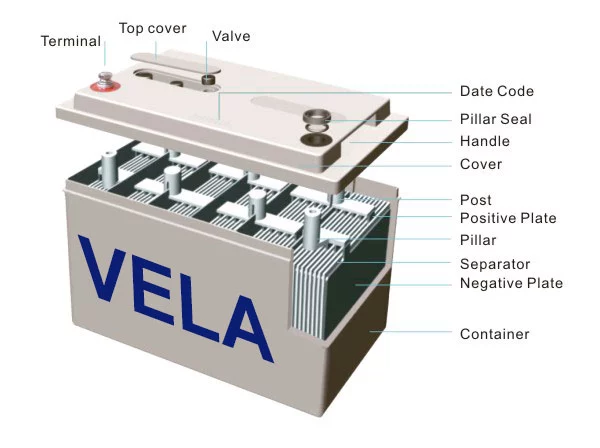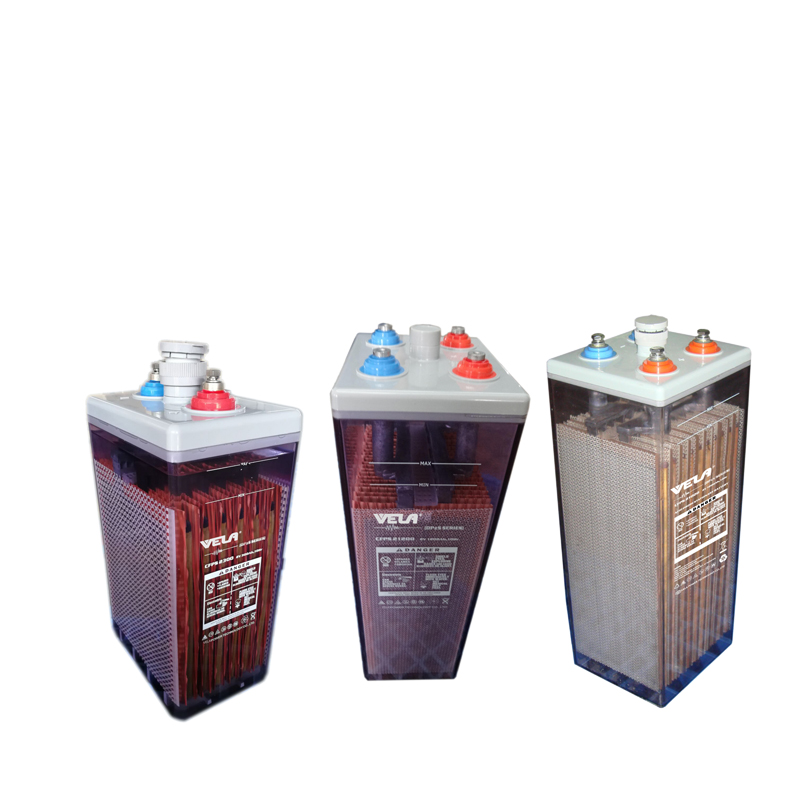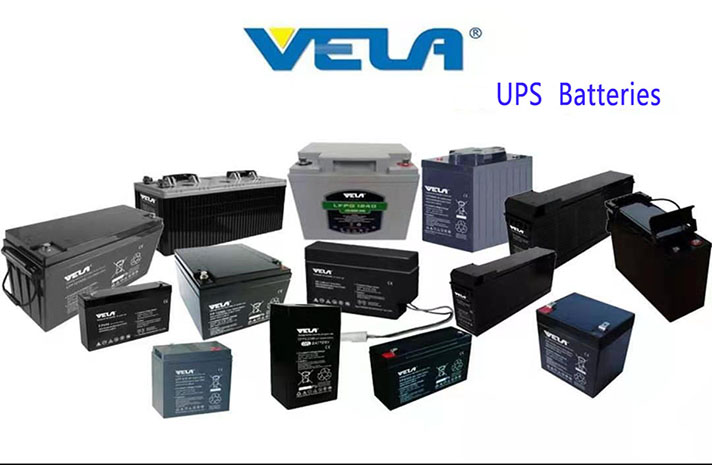
1.What are the battery types for UPS ?
The UPS system is one of the most crucial components in the critical power infrastructure, and about the UPS system, the batteries are really the “heart” of that system. Even though your UPS system needs that “heart”, batteries are usually been neglected. In this essay We’ll introduce more details about each type of battery that can be used in a UPS system and the advantages and disadvantages for each type. It should be noted though, that regardless of the batteries you choose, all batteries decrease in their ability to store and deliver power over time. However, if you follow all guidelines for storage, maintenance and usage, eventually you will still have to replace UPS batteries on a schedule to get the best usage out of your UPS. There are three main types of UPS batteries.Valve Regulated Lead Acid (VRLA), Flooded Cell or VLA batteries and Lithium Ion batteries.
2.1 Valve Regulated Lead Acid (VRLA) batteries.
This battery type is the most frequent type in UPS unit today. The term valve regulated relates to the way gas is released from the battery. If the gas pressure becomes too great in the battery, a valve will vent when the gas reaches a certain pressure. Water can’t be added to VRLA batteries, so factors that increase evaporation, like ambient temperature and heat from charging current, reduces battery life. VRLA typically have less up-front costs than flooded cell batteries, but they also have a shorter life, about 5 years totally. This type of battery also requires less maintenance than the flooded cell battery. The best environment for VRLA batteries is to be stored at room should be in a dry, climate and controlled room.
 2.2Flooded, or Wet Cell(OPZV& OPZS)batteries
Flooded cell, or VLA batteries, are very reliable, and typically have a 20 year life. The battery is composed of thick, lead-based plates flooded with electrolyte acid. Compared with VRLA,there are more safe measures needed with this type of battery and they need their own separate battery room due to potential chemical hazards they pose. They also typically have higher upfront costs than other batteries.
2.2Flooded, or Wet Cell(OPZV& OPZS)batteries
Flooded cell, or VLA batteries, are very reliable, and typically have a 20 year life. The battery is composed of thick, lead-based plates flooded with electrolyte acid. Compared with VRLA,there are more safe measures needed with this type of battery and they need their own separate battery room due to potential chemical hazards they pose. They also typically have higher upfront costs than other batteries.
 2.3 Lithium Ion batteries.
Lithium Ion batteries have matured significantly in their design for a number of applications, such as being used in electric vehicles and UPS storage. These batteries have the advantage of small size and light weight, and they also have built in battery management and not just monitoring. The disadvantage of this type of battery is that they are very expensive compared to the other two batteries. Their typically manufacturing cost about 40% more than Nickel cadmium batteries.
3.VELA POWER produce best battery for UPS system.
VELA POWER has been engaged in the UPS power supply industry for many years and has accumulated rich professional experience. It is well versed in the corresponding applications of VRLA and flooded batteries in the UPS industry, and discern the development trend of the industrial batteries. We focus on safety, efficiency, energy saving, also design and research concepts to provide safe, stable and efficient VRLA products and solutions for users in various industries.
As a power supplier using VRLA batteries as energy storage, the company’s products are widely used in: communications, electricity, public security, finance, networking, medical, security, industrial automation, rail transit, aerospace and navigation and other fields to flexibly meet the needs of customers in various industries We pursue different needs and efficient innovation.
2.3 Lithium Ion batteries.
Lithium Ion batteries have matured significantly in their design for a number of applications, such as being used in electric vehicles and UPS storage. These batteries have the advantage of small size and light weight, and they also have built in battery management and not just monitoring. The disadvantage of this type of battery is that they are very expensive compared to the other two batteries. Their typically manufacturing cost about 40% more than Nickel cadmium batteries.
3.VELA POWER produce best battery for UPS system.
VELA POWER has been engaged in the UPS power supply industry for many years and has accumulated rich professional experience. It is well versed in the corresponding applications of VRLA and flooded batteries in the UPS industry, and discern the development trend of the industrial batteries. We focus on safety, efficiency, energy saving, also design and research concepts to provide safe, stable and efficient VRLA products and solutions for users in various industries.
As a power supplier using VRLA batteries as energy storage, the company’s products are widely used in: communications, electricity, public security, finance, networking, medical, security, industrial automation, rail transit, aerospace and navigation and other fields to flexibly meet the needs of customers in various industries We pursue different needs and efficient innovation.
 2.2Flooded, or Wet Cell(OPZV& OPZS)batteries
Flooded cell, or VLA batteries, are very reliable, and typically have a 20 year life. The battery is composed of thick, lead-based plates flooded with electrolyte acid. Compared with VRLA,there are more safe measures needed with this type of battery and they need their own separate battery room due to potential chemical hazards they pose. They also typically have higher upfront costs than other batteries.
2.2Flooded, or Wet Cell(OPZV& OPZS)batteries
Flooded cell, or VLA batteries, are very reliable, and typically have a 20 year life. The battery is composed of thick, lead-based plates flooded with electrolyte acid. Compared with VRLA,there are more safe measures needed with this type of battery and they need their own separate battery room due to potential chemical hazards they pose. They also typically have higher upfront costs than other batteries.
 2.3 Lithium Ion batteries.
Lithium Ion batteries have matured significantly in their design for a number of applications, such as being used in electric vehicles and UPS storage. These batteries have the advantage of small size and light weight, and they also have built in battery management and not just monitoring. The disadvantage of this type of battery is that they are very expensive compared to the other two batteries. Their typically manufacturing cost about 40% more than Nickel cadmium batteries.
3.VELA POWER produce best battery for UPS system.
VELA POWER has been engaged in the UPS power supply industry for many years and has accumulated rich professional experience. It is well versed in the corresponding applications of VRLA and flooded batteries in the UPS industry, and discern the development trend of the industrial batteries. We focus on safety, efficiency, energy saving, also design and research concepts to provide safe, stable and efficient VRLA products and solutions for users in various industries.
As a power supplier using VRLA batteries as energy storage, the company’s products are widely used in: communications, electricity, public security, finance, networking, medical, security, industrial automation, rail transit, aerospace and navigation and other fields to flexibly meet the needs of customers in various industries We pursue different needs and efficient innovation.
2.3 Lithium Ion batteries.
Lithium Ion batteries have matured significantly in their design for a number of applications, such as being used in electric vehicles and UPS storage. These batteries have the advantage of small size and light weight, and they also have built in battery management and not just monitoring. The disadvantage of this type of battery is that they are very expensive compared to the other two batteries. Their typically manufacturing cost about 40% more than Nickel cadmium batteries.
3.VELA POWER produce best battery for UPS system.
VELA POWER has been engaged in the UPS power supply industry for many years and has accumulated rich professional experience. It is well versed in the corresponding applications of VRLA and flooded batteries in the UPS industry, and discern the development trend of the industrial batteries. We focus on safety, efficiency, energy saving, also design and research concepts to provide safe, stable and efficient VRLA products and solutions for users in various industries.
As a power supplier using VRLA batteries as energy storage, the company’s products are widely used in: communications, electricity, public security, finance, networking, medical, security, industrial automation, rail transit, aerospace and navigation and other fields to flexibly meet the needs of customers in various industries We pursue different needs and efficient innovation.



